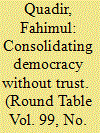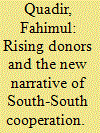|
|
|
Sort Order |
|
|
|
Items / Page
|
|
|
|
|
|
|
| Srl | Item |
| 1 |
ID:
093952


|
|
|
|
|
| Publication |
2010.
|
| Summary/Abstract |
This paper makes a departure from the dominant formalistic approach to 'democratic consolidation' to explore a range of issues, especially mutual distrust and misperception, to analyse why Bangladesh's quest for democracy remains elusive. By taking a closer look at the events that led to the collapse of democracy in 2007, it provides new insights into the failure of relevant political actors to reconcile their personal and political differences in order to give democracy a chance to take root in the country's seemingly dysfunctional political landscape. It suggests that the emergence of what can be called the politics of distrust was a major factor in the breakdown of democracy in 2007. Moving the debate beyond the practice of holding free and fair elections on a regular basis, it is argued that Bangladesh's prospect for fostering a democratic political culture depends on the ability of rival political actors to make concerted efforts to build credible, well-functioning legal and political institutions that cultivate a culture of trust not only among political parties but also between the democratic state and the ordinary citizens.
|
|
|
|
|
|
|
|
|
|
|
|
|
|
|
|
| 2 |
ID:
053296


|
|
|
|
|
| Publication |
Hampshire, Palgrave Macmillan, 2004.
|
| Description |
2v.(xiv,337p.; xiii ,226p. )
|
| Series |
International political economy series.
|
| Contents |
V.1. Globalization, democracy and civil society in Asia.
V.2. Democratic transitions and social movements in Asia.
|
| Standard Number |
140391883X
|
|
|
|
|
|
|
|
|
|
|
|
Copies: C:2/I:0,R:0,Q:0
Circulation
| Accession# | Call# | Current Location | Status | Policy | Location |
| 048440 | 320.95/LEL 048440 | Main | On Shelf | General | |
| 048441 | 320.95/LEL 048441 | Main | On Shelf | General | |
|
|
|
|
| 3 |
ID:
018000


|
|
|
|
|
| Publication |
July 2000.
|
| Description |
197-212
|
|
|
|
|
|
|
|
|
|
|
|
|
|
|
|
| 4 |
ID:
121762


|
|
|
|
|
| Publication |
2013.
|
| Summary/Abstract |
This article aims to provide a critical analysis of how the 'emerging donors' are redefining the structure of development cooperation in the new millennium. It offers an overview of the growing role of Brazil, China, India and South Africa in shaping the conditionally driven framework of official development cooperation. By reviewing the aid coordination mechanisms of the Southern donors, the article also seeks to provide a context for comprehending the challenges for Southern countries to systematically manage, monitor and deliver aid. It argues that the Southern donors' interest in changing the dominant conditionality driven narrative of aid has opened up the possibility for constructing a new aid paradigm that focuses more on the strategic needs of the partner countries than on advancing the ideological interests of the donor countries. However, without assuming a much greater role in providing overseas aid and without building a unified platform based on a shared development vision, Southern donors will not be able to meaningfully alter the current dac -dominated aid architecture.
|
|
|
|
|
|
|
|
|
|
|
|
|
|
|
|
| 5 |
ID:
118656


|
|
|
|
|
| Publication |
2012.
|
| Summary/Abstract |
There is general consensus in scholarly and policy circles that the global aid regime is undergoing major changes. Analysts have examined the emerging trends in development cooperation, and have identified the 'emerging donors' and other 'non-DAC [Development Assistance Committee] donors' as the source of important quantitative shifts in global aid flows (Manning 2006). Some scholars have described systemic fracturing in the established global aid regime (Woods 2008), while others have discussed the declining effectiveness of the traditional donors, a weakening of the so-called 'Washington Consensus' or the decline in the conventional structures of the aid delivery mechanism led by the Organization of Economic Cooperation and Development (OECD) DAC (Lancaster 2007; Birdsall and Fukuyama 2011; Chaturvedi et al 2012). There is a burgeoning literature around the impact of the rising states on Africa, in trade, aid and investment, society and politics, especially China's impact (Taylor 2006; 2008; Alden 2007; Rotberg 2008; De Haan 2010; Krageland 2011). Yet much is to be done in terms of systematically and critically analysing the details of the policy intentions, political-economic motivations and programing objectives of the BRICS (Brazil, Russia, India, China and South Africa) as aid providers and their impact on the less developed countries.
|
|
|
|
|
|
|
|
|
|
|
|
|
|
|
|
|
|
|
|
|